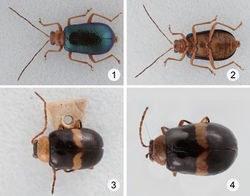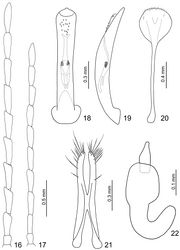Difference between revisions of "Dercetina barclayi"
m (Imported from ZooKeys) |
m (1 revision) |
(No difference)
| |
Latest revision as of 11:57, 13 August 2013
| Notice: | This page is derived from the original publication listed below, whose author(s) should always be credited. Further contributors may edit and improve the content of this page and, consequently, need to be credited as well (see page history). Any assessment of factual correctness requires a careful review of the original article as well as of subsequent contributions.
If you are uncertain whether your planned contribution is correct or not, we suggest that you use the associated discussion page instead of editing the page directly. This page should be cited as follows (rationale):
Citation formats to copy and paste
BibTeX: @article{Lee2013ZooKeys323, RIS/ Endnote: TY - JOUR Wikipedia/ Citizendium: <ref name="Lee2013ZooKeys323">{{Citation See also the citation download page at the journal. |
Ordo: Coleoptera
Familia: Chrysomelidae
Genus: Dercetina
Name
Dercetina barclayi Lee & Bezděk, 2013 sp. n. – Wikispecies link – ZooBank link – Pensoft Profile
Type series
Holotype ♂ (BMNH): “Doherty / Birmah RubyMes / Fry Coll. 1905. 100.”. Paratypes: 1♂, same as holotype (BMNH); 1♂, 2♀♀: “Ruby Mines. Burma. 5.500 to 7.500 ft. 1904-150.” (BMNH); 4♂♂, 1♀: “Ruby Mines U. M. / Gift of F. G. Bowditch” (USNM).
Diagnosis
This new species is similar to Dercetina taiwana but differs by yellowish brown antennae, no color variation, wider penis, and with longer endophallic sclerites.
Description
Color (Figs 3–4) bluish black, prothorax, coxae, and tibiae yellowish brown; elytron with one trasverse white stripe at basal 1/3; head brown, vertex and labium black. Head smooth and impunctate. Pronotum transverse, 2.2 times wider than long, evenly convex on disc and lacking fovea or punctured depression, disc with scattered fine punctures; lateral margin rounded, anterior margin slightly concave, posterior margin straight. Elytra more or less widened posteriorly, apex convergently rounded, 1.4-1.5 times longer than wide, disc with punctures in part arranged in longitudinal rows, epipleurae smooth and impunctate.
Male. Length 3.9–4.3 mm, width 2.1–2.4 mm. Antennomeres III-X weakly serrate (Fig. 16), ratio of length of antennomeres III to XI about 1.0: 1.2: 1.2: 1.2: 1.2: 1.2: 1.1: 1.1: 1.3; ratio of length to width of antennomeres III to XI about 2.6: 3.0: 3.3: 3.4: 3.4: 3.9: 3.8: 3.7: 4.8. Penis (Fig. 18) extremely slender, about 7.3 times longer than wide, parallel-sided, basally and apically widened, apex narrowly rounded; tectum membranous, with scatted stout setae; weakly curved in lateral view (Fig. 19); endophallic sclerites elongate, about 0.5 times as long as penis, dorsal sclerite with base bifurcate, apex truncate; ventral sclerite much longer than dorsal sclerite, apex bifurcate, base rounded, with a cluster of short setae at middle; in lateral view moderately curved. Female. Length 4.7–5.3 mm, width 2.8–3.1 mm. Antenna 11-segmented, antennomeres III-X weakly serrate (Fig. 17), comparatively narrower than male, ratio of length of antennomeres III to XI about 1.0: 1.2: 1.2: 1.2: 1.2: 1.2: 1.0: 1.0: 1.2; ratio of length to width of antennomeres III to XI about 3.2: 3.6: 3.4: 3.6: 3.5: 3.3: 3.0: 3.2: 3.8. Sternite VIII (Fig. 20) weakly sclerotized subapically, apex rounded, with dense short setae along lateral and apical margin, spiculum long. Spermathecal receptaculum (Fig. 22) strongly swollen; pump narrow and strongly curved, apex widely rounded; spermathecal duct short, deeply projecting into receptaculum. Gonocoxae (Fig. 21) narrowly connected in middle, about 5.5 times longer than wide, slightly curved inwards near apex, apex rounded, with one short setae at apical 1/3, ten to eleven setae at apex.
Etymology
This new species is named for Maxwell V. L. Barclay who is one of Britain’s leading entomologists and curator of Coleoptera at the Natural History Museum in London.
Distribution
Only known from the type locality.
Original Description
- Lee, C; Bezděk, J; 2013: Revision of the genus Dercetina from Taiwan and their similar species, with description of a new species from Myanmar (Insecta, Chrysomelidae, Galerucinae) ZooKeys, 323: 1-33. doi
Images
|

